The word “free” is omitted here, it is inappropriate — how else can you get a flat in the DPRK?
The word “free” is omitted here, it is inappropriate — how else can you get a flat in the DPRK?
DPRK, The land of smiles and wonders – Pt. 5: Worship the people like the sky
By Stary Shakhtyor
– Who lives in these houses? We were travelling along the canal of the Taedong River, on which Pyongyang is situated. I notice cozy houses with several floors, with flats rising up steps above the embankment. Obviously, a privileged class must live here. In Moscow, the price per square metre of this housing would be off the scale.
– In these houses live simple, ordinary people, workers, scientists, intellectuals, – they answer me. Truly, I am in a wonderland.
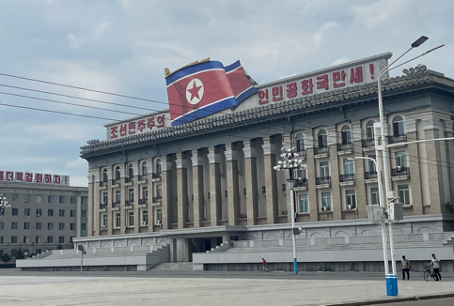
The word “miracles” came up a lot in the lectures we listened to this morning.
For example:
“The DPRK is a country of proud people, a country of unanimous unity with the undivided domination of ideology, a country of miracles!”
The housing program is one of the priorities of North Korea’s domestic state policy.
“Thanks to the Party, new wonders are being created. 44 new structural objects were built in December 2023,” the lecturer told us.
Moreover, flats are being built not only in Pyongyang, but also in the provinces, including for peasants.
“So that people in the provinces laugh too, and their laughter can be heard from the remote lands to the center.”
10,000 flats are rented every year. It is already a tradition for Koreans who have received a flat in the countryside to call their relatives in the cities to celebrate the housewarming party. We got a flat here, just like that! (The word “free” is omitted here, it is inappropriate – how else can you get a flat in the DPRK?).
All construction is being carried out under the careful guidance of the Party and the Chairman of State Affairs, Grand Marshal Kim Jong-un. The criterion for evaluating the work of the Party and the state organs is the smiles of the people, which shows how happy the Koreans are. This criterion is spelled out in official statements. In general, the language of all kinds of official communiqués and state documents of the DPRK, including even legislative ones, is full of pathetic and lofty metaphorical turns. As a philologist, it is clear to me that in this way, the governing bodies appeal to feelings, to emotions, sometimes in opposition to rationality, dry logic and pragmatism. Emotional words stir up great things. Emotions help to make super efforts. Miracles are done only with over-exertion. Super efforts are very necessary in the country, which for decades has been under total blockade and sanctions from the outside world. To survive, the country is in a state of constant revolution. The revolution takes place in three directions: ideological, technical and cultural – one of the theses of Juche ideas. The revolution does not end in one generation, but continues through all generations and must end victoriously. According to the idea.
“And a motor car travelling at high-speed stops, if it is not supplied with additional fuel. Similarly, the enthusiasm of the masses will immediately cool down, if it is not ignited by the fire of ideological work,” I noted out from a past lecture.
Building a happy future is also done with the help of competition. But not the kind of competition that exists in the Western world.
“Without competition, development is unthinkable. However, competition for existence in the biological sense is based on the rule: ‘the strong are destined to stay alive, the weak – to die. And the movement of ‘catching up and overtaking, learning from the frontrunners, sharing experience’ assumes that in a society in which people help each other and pull each other up, everyone together is destined to win.”
“One for all, and all for one” is another Korean slogan that is familiar and understandable to a Russian person.
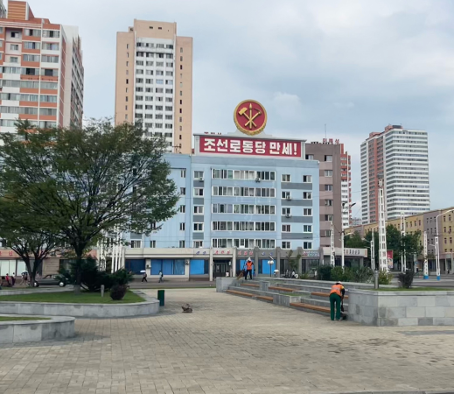
Kim Jong-un is known to be familiar with Western life. He travelled to the West for some time, lived there, and saw how people live. When he became the head of the state he inherited after the death of his father, he apparently set himself the goal of raising the standard of living of the Korean people. His main slogan today, reflecting his general strategy, is “The masses come first”.
The Juche philosophers have summed up his statement with the whole ideological base, which is also read by us, foreigners. Juche philosophers immediately revealed the continuity, as it turns out that Kim Il Sung also admonished to “Worship the people like the sky”.
Kim Jong-un has begun to tighten the party nomenklatura and officials to his general line. The next lecturer, a man, told us that once a road in one province was snowed over, and the officials, at night, in the freezing cold, sent their citizens out to clear it. Kim Jong-un was very angry when he heard about this and ordered these officials to take up their own tools and shovel the snow at night, so that they could feel the suffering they had put the people through.
Now that’s something the people would love! Let the higher ranks run around and experience for once what they subject ordinary people to.
You have to be closer to the people, they say in Russia. And Kim Jong-un pointed out that party workers “should work shoulder to shoulder with the masses, talk to them familiarly (it is written in the notes – ‘familiarly’!), educate them with the ideas and line of the party, by personal examples, raise them to do things, (…) and themselves unconditionally fulfil them, even if for this purpose the body will be torn into ten, a hundred pieces”. “To fulfil the plans of the Party to take on more deeds and run, run after deeds to the holes in the soles of the shoes” – I am not tired of writing out pathetic statements either.
Take s stroll thorugh Pyongyang’s streets following this video link: https://dzen.ru/video/watch/670139c2b022c20629fe39c1?share_to=link
– These houses were built in two years, adds the attendant. Earlier we learnt that he himself lives on Scientists’ Street, a street that can be recognised by the tallest high-rise building with a picture of an atom – electrons revolving around the nucleus. As I understand it, they get a flat at work. There is no need to queue. Girls and boys live with their parents, and when they get married, they get a flat.
We go to see another main attraction – a monument to the ideas of Juche in the form of a concrete torch, which is installed on the other bank from our hotel “Koryo”, but from the height of 21 floors, where we were settled, it is clearly visible. At night it glows in the dark. As does the illumination on the portraits of the leaders at the nearby administrative building.
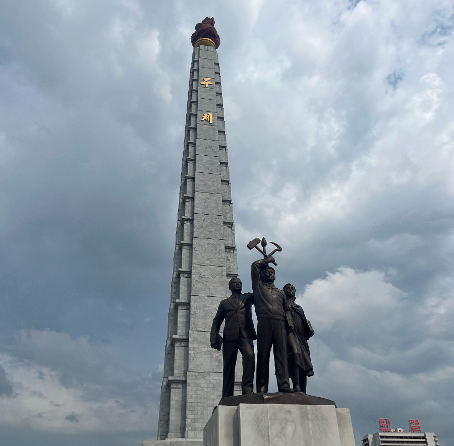
The torch stele is 170 meters high and consists of 18 tiers. In front of it stands a 33-ton bronze monument of the trio – worker-peasant-intelligent. The worker is in front, holding a hammer, the peasant woman on the right, holding a sickle, and the intellectual on the left, clutching a brush used to draw hieroglyphics. Hammer, sickle and brush are the official symbols of the DPRK. As a representative of the intelligentsia, I am impressed by the presence of an intellectual. In Russia, at the birth of the USSR, the intelligentsia was not considered very much, but here they have not forgotten us. That is why the language of official communiqués here is very artistic.
At the entrance to the stele and inside there are stone plaques with inscriptions of different party and non-party organizations from all over the world. There are plaques from our compatriots, from LDPR (Liberal Democratic Party of Russia) and from CPRF (Communist Party of the Russian Federation).
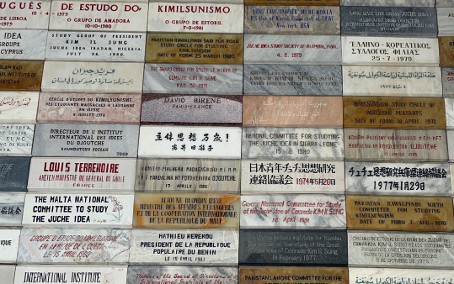
We take the lift to the top of the observation deck. It takes a long time to get up there. The observation deck is located at the foot of the fire and offers an all-round view. Opposite, across the river is the Palace of Studies, the pointed pyramid of Ryugen is visible, and accordingly our hotel. On the right is the May Day Stadium, which is the biggest in the world, with 120,000 seats. Koreans like to be first. But we have the impression that it is not often used.
Beyond the river is the western part of Pyongyang, it looks more interesting. On the eastern side – suitcases of high-rise buildings, residential development, dormitory districts. But we were told, there are plenty of hospitals and clinics, as well as institutes and educational campuses. In the eastern part, an 80-storey skyscraper stands out. It was built in a year and a half – the Ryugen Hotel comes to mind again, why didn’t they open it? Underneath the skyscraper is the Taedongan Brewery, whose products we have already drunk a lot of since our arrival.
In the eastern part there is also a stamp museum, where we were taken afterwards. I am not interested in stamps, but you can learn interesting information from them. For example, one of them shows a drone – DPRK is not lagging behind in the arms race. Another one shows a Korean soldier in modern uniform, helmet, body armor, armored neck brace, he is launching missiles by radio, where to – it is easy to guess. Behind him is another fighter with some kind of miracle automatic weapon. The machine is difficult to recognize, it has optics, tuning, everything. The stamps are all different, on different subjects. Of course, there are stamps of deceased and living leaders. Stamps of Russian-Korean friendship, space, nature, history. Chess – one of them depicts world champion in the past and now foreign agent Garry Kasparov, he would be surprised if he learnt that the DPRK issued a stamp with his image. There are a lot of souvenir products, besides stamps, all sorts of flags, dolls, badges, calendars. One has a picture of a Korean smartphone factory. I forgot to mention that smartphones are widespread in Pyongyang, everyone accompanying us has one. A smartphone is not a luxury here, but a means of communication and entertainment – when you are driving, you see half of the passengers on the next tram have their mobile phones on.
After visiting the stamp museum, the program didn’t end, local comrades invited us to a restaurant. It was not far from the hotel, and we were allowed to walk to it, accompanied, of course, on foot. The restaurant was called “Culture”, it was a decent restaurant, it was definitely a place where ordinary people had a cultural holiday, and it was possible to pay with dollars. We were taken into a room and sat down near a round table. The table was spinning – here it is customary to order portions not for oneself, but for everyone, so that everyone would spin the table and try all the dishes. The food is spicy, some dishes are impossible to eat without a sip of Taedongan. After everyone had eaten to their hearts’ content, they brought everyone a bowl of kuksi, which is a cold soup that is best prepared in Pyongyang, even southerners acknowledge this. It consists of cold broth in which a skein of buckwheat noodles is rolled up. On top are sliced radish, herbs and ham, with half a hard-boiled egg floating nearby. It’s all to be stirred in on its own, with spices and mustard added to taste. But, as Kim Il Sung taught, you must first pour vinegar, not into the broth, but onto the buckwheat noodles.
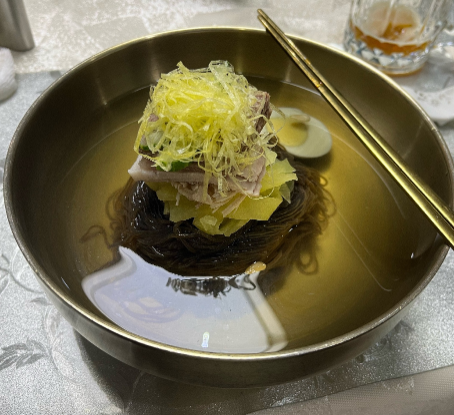
The portion was huge, it was impossible to eat it on a full stomach, and I was subjected to the “psychology of defeatism and surrender, resigned to difficulties and obstacles” and only tried this “Korean okroshka (Russian soup-UWI)”.
As soon as we left the restaurant, the lights went off again.
To be continued…
This article was previously published in Russian here. Translation to English by UWI.

















Leave a Reply